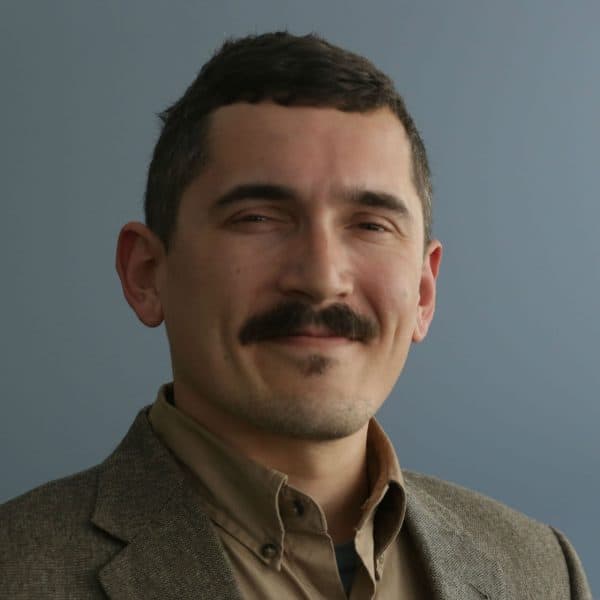Advertisement
In Puerto Rico, Community Groups Transform Into Relief Brigades
Resume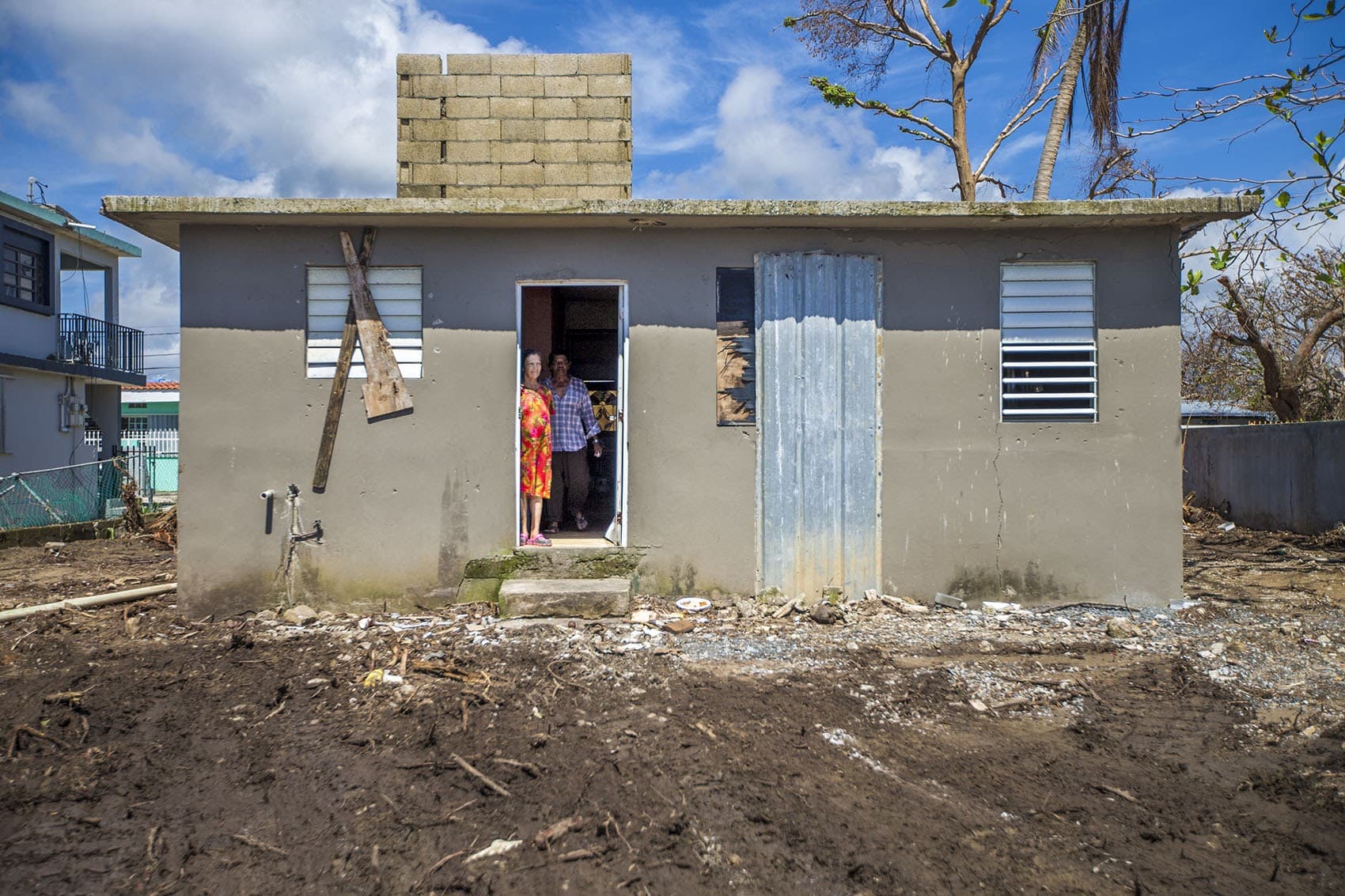
It's been a month since Hurricane Maria, but residents of Puerto Rico are still coping with the devastation. Several community groups — many of them nonprofits with missions they have had to suspend in the wake of Maria — are working to provide relief across the island. Here are three.
Proyecto Enlace
Carmen Osorio stands on the second floor of her two-story home, sun beating down through the rafters where a roof once kept out the elements.
"We had never gone through such a difficult situation," Osorio said with a look of resignation on her face. "We have had storms in the past but not so strong. I wasn’t expecting everything to be destroyed."
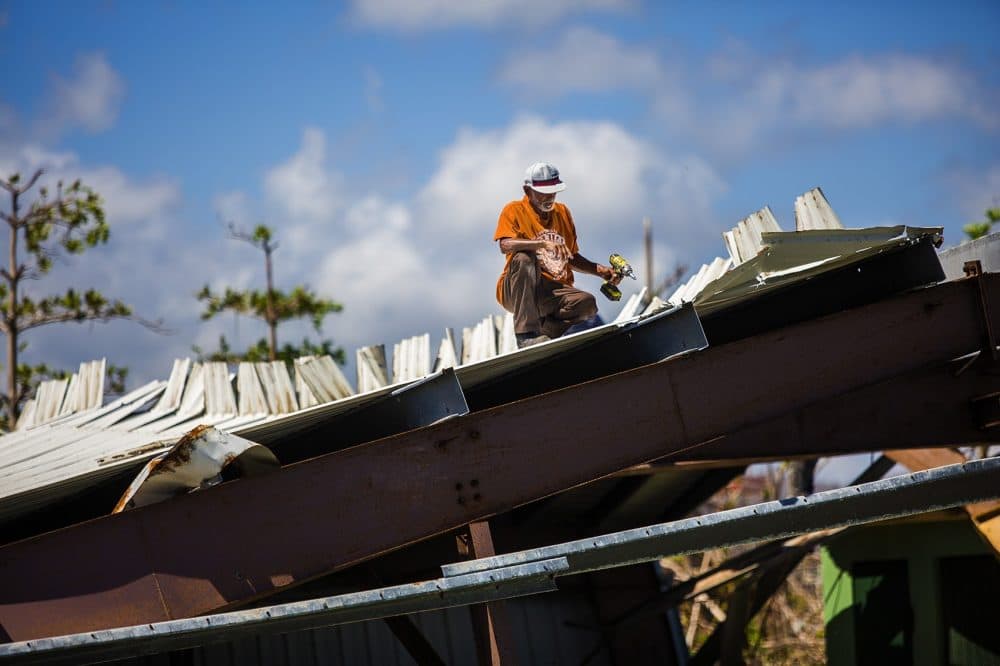
Osorio lives in the neighborhood of Buena Vista, Santurce, which is part of the municipality of San Juan. In contrast to the high-rise apartment buildings along the ocean are the eight neighborhoods built along the Caño Martin Peña, a tidal channel that cuts through San Juan.
Some 26,000 people live along the channel — a historically marginalized community, and one of the most densely populated areas in Puerto Rico, according to a community group that serves the eight communities. Everyone here was affected in some way or another by Hurricane Maria.
In the case of Osorio, the storm took her roof and nearly everything she owned, except for a TV and some clothing.
"We had never gone through such a difficult situation. We have had storms in the past but not so strong. I wasn’t expecting everything to be destroyed."
Carmen Osorio
Times are dark in Puerto Rico, but on a recent weekday morning, the light for Osorio came in the form of a tarp that could give her a few months of protection from the elements before she gets money from the government (she hopes to get money, anyway) to build a more permanent roof.
"We'll see if we can fix this," Osorio said with a shrug. " If we can, we can, and if not, we'll have to continue living with what God sends us."
The tarp came to her through Proyecto Enlace Del Caño Martin Peña. It's an alliance of community groups comprising the eight neighborhoods along the channel. The group focuses on environmental restoration, anti-gentrification and poverty reduction. But these days they're patrolling the streets and helping wherever they're needed.
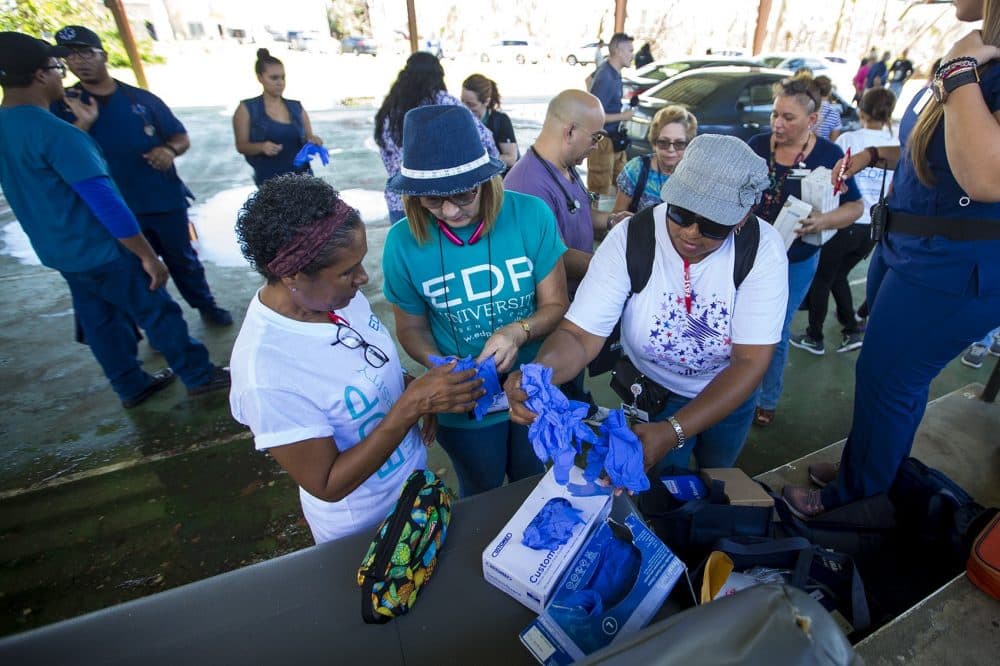
Across Puerto Rico, community-based groups have transformed into de facto relief brigades, setting aside their missions to meet the most immediate needs of their communities, whether it's food, water, shelter, medicine, disinfectants or other life-and-death necessities.
The groups are calling on the Puerto Rican "diaspora" and anyone else to send financial support, and many on the mainland have answered the call.
The state has a responsibility here. As a community organization, as a nonprofit, we don’t want to take over the responsibilities of the state.
Mario Nuñez, a community leader with Proyecto Enlace
A group led by Puerto Ricans in the Boston area — the Massachusetts United for Puerto Rico Fund, backed by the Boston Foundation as well as the governor and the mayor — is on its way to raising $2 million in the wake of Maria. The money will be used to aid Boricuas arriving in Massachusetts, but also to support community groups across Puerto Rico.
WBUR traveled to Puerto Rico three weeks after the hurricane to visit some of the groups receiving help — Proyecto Enlace in San Juan, Taller Salud in Loiza, and PECES in Humacao.
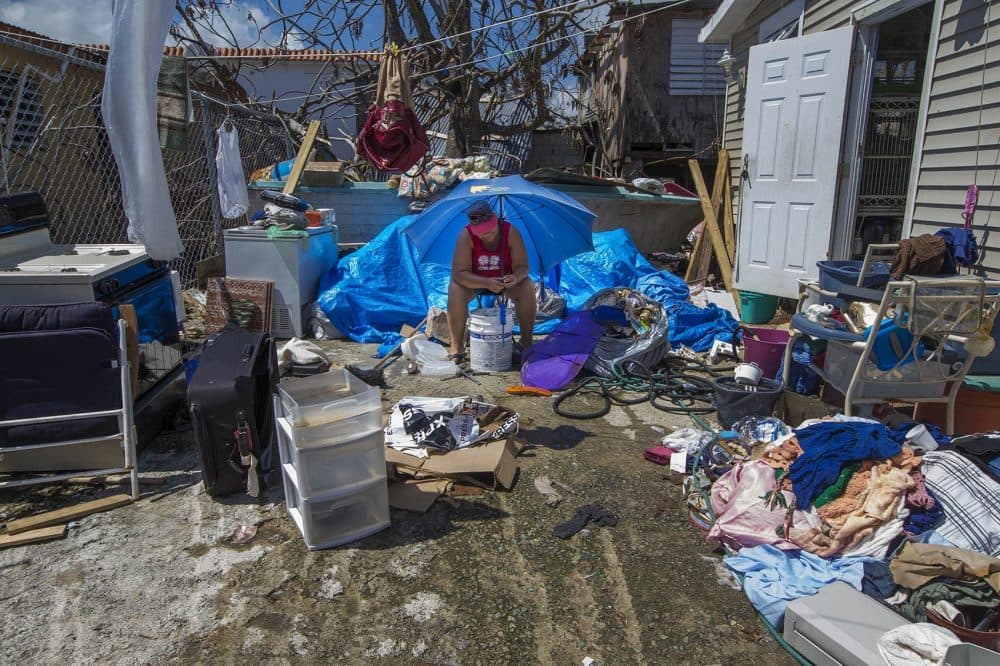
Mario Nuñez is a community leader with Proyecto Enlace. Asked whether it's possible to focus on disaster relief while also carrying out the group's larger goals, Nuñez says he doesn't know, but he's trying.
"To not lose our focus on the work we do? I can’t tell you whether or not it’s possible. But I can tell you that we are doing it, from day to day," Nuñez said with a grin.
Nuñez feels his group has no choice but to do crisis work. But he wants the government to step in and do its part as well.
"The state has a responsibility here. As a community organization, as a nonprofit, we don’t want to take over the responsibilities of the state," he said.
Proyecto also wants to prevent the duplication of efforts — something WBUR witnessed while driving through the neighborhood. An official from New York City was out in the streets trying to assess the needs of the community, and a Proyecto worker later told us another team had been through to do the same work.
By working with a group like Proyecto Enlace before heading out into the streets, the group says the collective effort will have a far greater impact.
PECES
The southeast of Puerto Rico is where Hurricane Maria first made landfall. In the coastal town of Punta Santiago, the houses, the utility polls, the gas stations, the vegetation — all of it was battered not just by wind, but by major flooding as well.
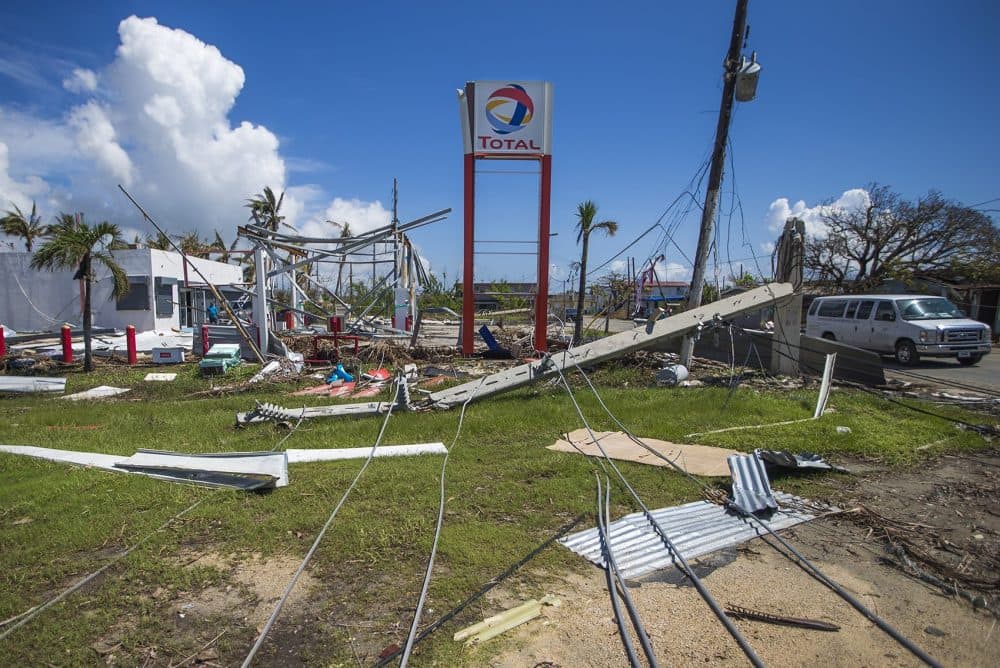
Under a large awning on the property of a nonprofit in Punta Santiago, several dozen volunteers hold hands to form a prayer circle before heading into the town. Mariny Vazquez Maldonado of the medical group HIMA San Pablo says there was news of hunger in Punta Santiago.
"You see the pettiness of politicians and you see services not arriving," she said, fighting back tears. "I'm worried that while [various relief efforts] are out here tripping over one other, people are dying of starvation. One person here lost his legs, because he was cut by a metal sheet and help didn't arrive in time.
"The problem is not the hurricane, it’s that help did not arrive in time."
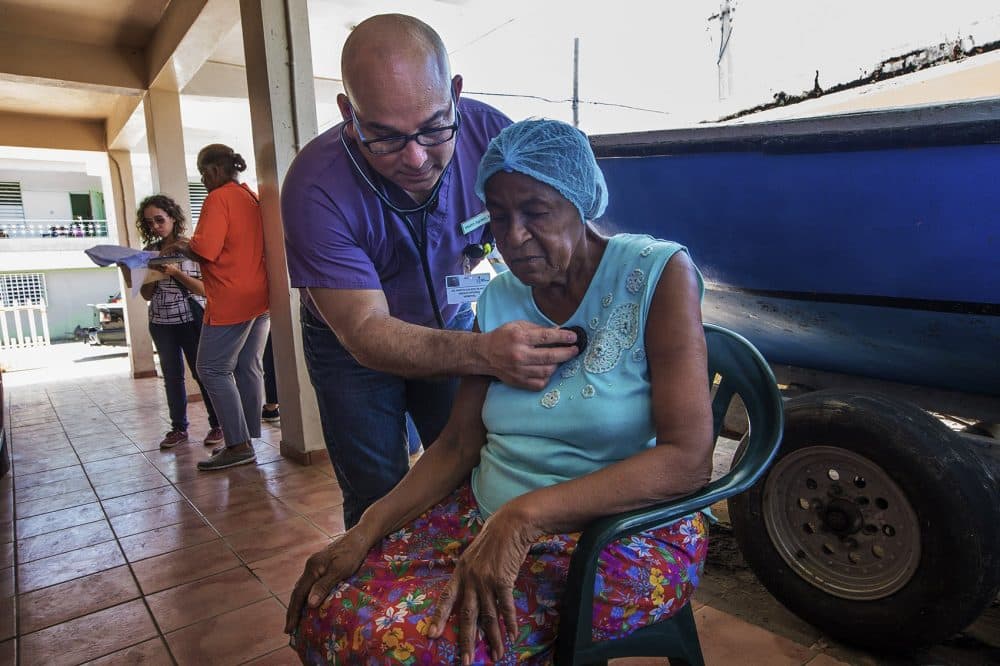
That lack of coordination is a problem facing the groups trying to carry out relief work. Whether it's because of poor planning by central authorities, the obliteration of telecommunication infrastructure at a time when it's most needed, or a bogged down response by government entities, community groups in Puerto Rico are turning to each other.
In Punta Santiago, these health care workers are taking cues from PECES, which has been in the town since 1985 and serves all of Southeastern Puerto Rico. Everybody in Punta Santiago knows of PECES, which operates a school and employs about 100 people. The group has also suspended its normal work to focus on the recovery.
PECES Vice President Pedro Morales Oquendo stands on a beach in Punta Santiago, in front of the ruins of a dock where the town's fishermen would set out for sea. The force of the ocean was so great it pried the planks from the dock and deposited them throughout the town.
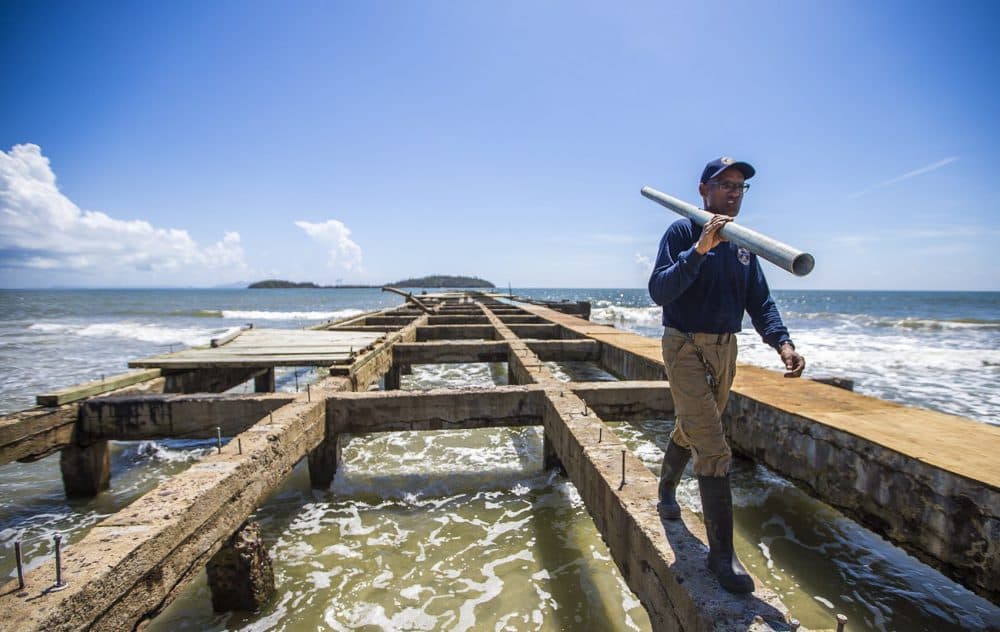
Morales says the government needs to do more to help Punta Santiago — and to do so they need to seek guidance from groups with roots in the communities.
"We know where the houses are, which are the ones that lost everything, which are the ones that lost their roofs, where the bedridden are located," he said. "We can bring help directly to them. The government can’t do that."
And Morales says if Puerto Rico is to avert another crisis — the looming threat of exodus — help is needed urgently.
"If we don’t lift up Punta Santiago ... and you can see this is an area with a lot of businesses [that cater to the tourism sector] there’s going to be an exodus of the population to the [mainland] United States," he said.
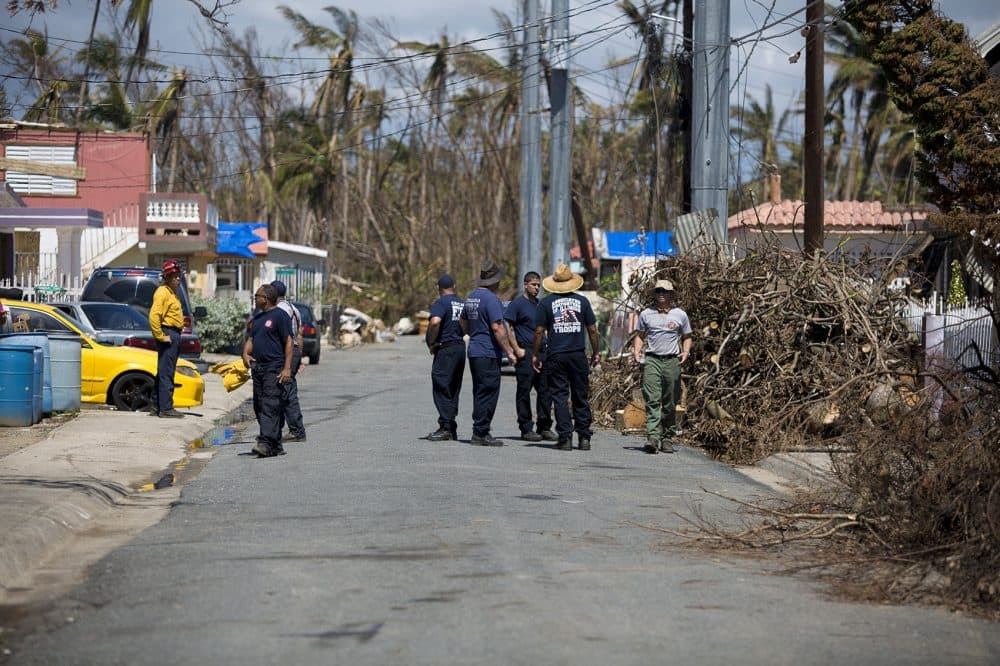
Taller Salud
To the east of San Juan is the municipality of Loiza, where a women's empowerment group called Taller Salud is doing disaster relief. The headquarters has become a makeshift warehouse, stocked with essentials from food and hygienic products to over-the-counter medicines.
A few miles away, inside a community center in the town of Piñones, there's an oasis from the wreckage. Taller Salud is running a free kitchen three days a week. They've also brought in a team to offer acupuncture and massage therapy. People enter the room with so much stress you can almost smell it — and they exit with an air of tranquility.
"I feel good," says Piñones resident Maria San Miguel with a smile, tiny bandages over the spots in her ear where she received acupuncture. "I was feeling pain that I no longer feel, and the truth is, the acupuncture works."
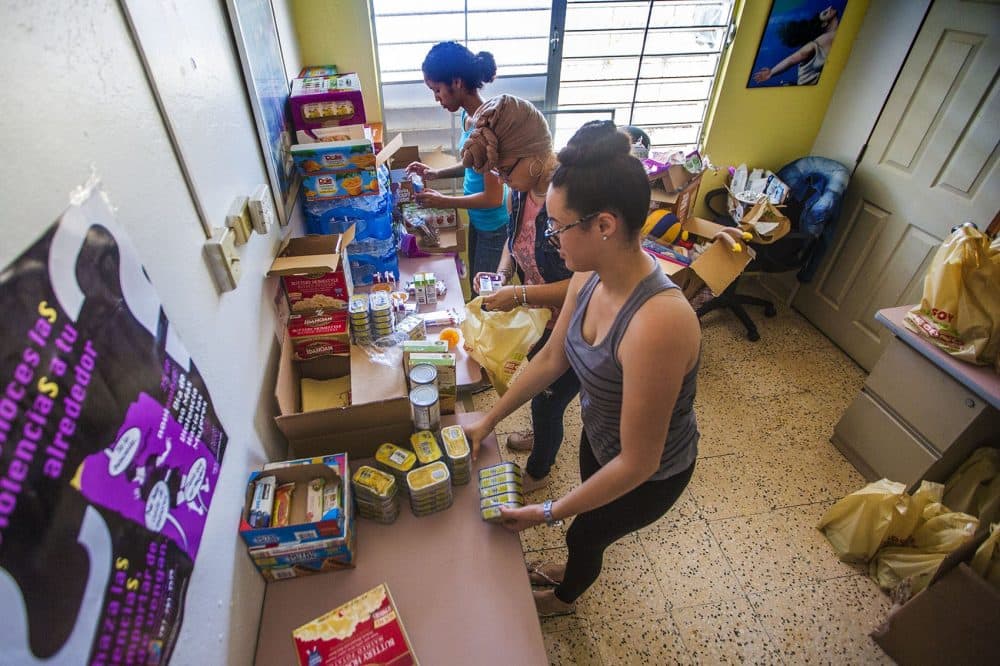
San Miguel is a volunteer for Taller Salud. She lost her house when the hurricane hit the town, and for the meantime she's staying with a sister. San Miguel is dealing with arthritis in her knee and painful swelling in her arm. She's missed meals, and the last time she had bottled water was more than four days before we last spoke. But she says helping her neighbors gives her energy.
"The people of the community are the ones who are dealing with this [recovery], giving our help to other people so we can continue forward," she said. "I passed through the hurricane and lost my house. But I feel satisfied helping other people who also lost theirs."
Residents like San Miguel watch as government and international aid groups pass through, offering some goods or services before moving on to the next town or back to San Juan. But Taller Salud is part of Loiza, and even though its new to this kind of work, the group has no plans of leaving.
This segment aired on October 20, 2017.

